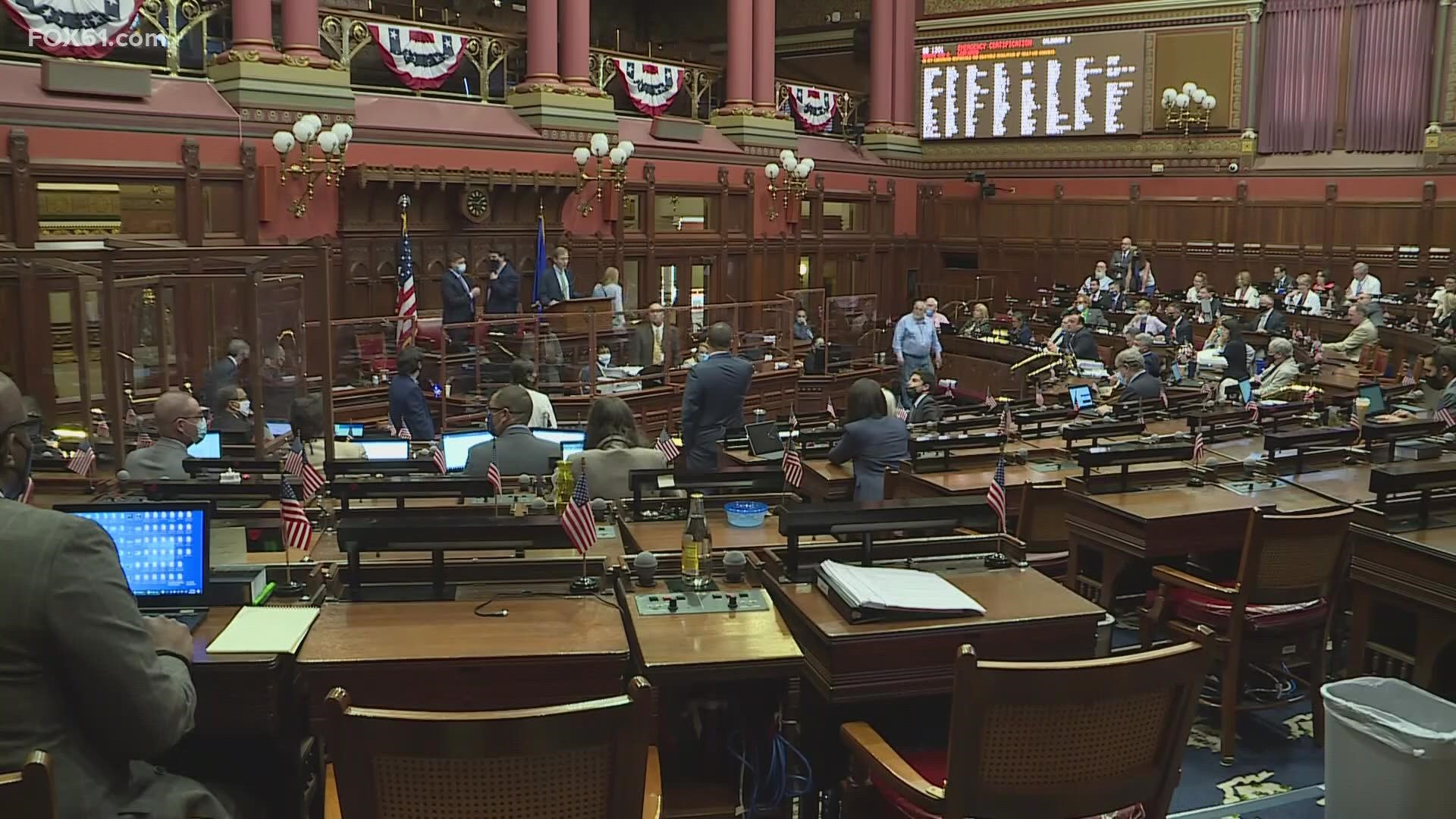Legalized marijuana, sports betting, and religious exemptions from vaccines: Connecticut's politics in 2021
The state legislature had to try and navigate COVID-19 once more while passing major pieces of legislation.

Into the second year of the pandemic, 2021 was a unique year in Connecticut politics.
The state legislature had to try and navigate COVID-19 once more while passing major pieces of legislation. Republicans and Democrats butted heads, protests were held, and debates were formed.
Here’s a look back at the last year in Connecticut politics.
New Year, New Goals
Connecticut’s legislature was sworn in on Jan. 6 outside in the cold. But winter weather wasn’t all that greeted them.
Protestors, gathered over a number of issues regarding the pandemic, social justice, as well as vaccine exemptions, were also there, wanting to make their voices heard.
Gov. Ned Lamont gave his state of the state remotely that early afternoon, calling on the legislature to take a look at sports betting and at legalizing marijuana. Both legislative initiatives passed this year.
Lamont closed his speech by saying, "Through our shared values and commitment to one another, we will rise above this crisis and build a better tomorrow. Today is the first day of Connecticut’s comeback story."
Read a summary of his speech here.
All of this happened on the same day that a deadly insurrection was underway at the nation’s Capitol Building, forcing lawmakers into lockdown as scary moments played out hour after hour.
But back home in Connecticut, new rules were put in place for state lawmakers when it came to voting. The new rules allowed them to vote from their cars as the legislature worked to safely return while the pandemic continued on after last year’s session was canceled due to COVID-19.
New Laws
The Democratically held state legislature tried to make up for lost time as they passed major pieces of legislation.
Lawmakers answered the nationwide calls for social justice reform and tackling systemic racism following months of protests and debate sparked by the death of George Floyd in May 2020.
Connecticut passed the Clean Slate Bill, which wiped away certain convictions such as misdemeanors and lower-level felonies after a set time period.
Bi-partisan legislation also declared racism as a public health crisis.
Connecticut also became the eighth state to put the Creating A Respectful and Open World for Natural Hair act, otherwise known as the CROWN Act, on the books. The legislation makes it illegal to discriminate against hairstyles that are historically associated with race.
Lawmakers also tackled the much-heated debate over repealing the religious exemption for routine childhood vaccinations. The exemption was repealed on April 27 and signed into law two days later by Lamont.
The bill grandfathers any children who are already in public schools and uses the religious exemption.
Lamont said the legislation is needed to protect kids against serious illnesses like measles, tuberculosis, and whooping cough that have been well-controlled for decades using vaccines but have reemerged.
The state legislature also tackled domestic violence as they passed a bill nicknamed “Jennifer’s Law”.
The bill expanded the definition of domestic violence to include coercive control. The bill was named for Jennifer Magnano, killed by her husband in front of her children, and Jennifer Farber-Dulos, presumed dead after she went missing in Mary 2019. Her estranged husband Fotis was charged with murder in connection to her disappearance and later took his life in January 2020.
And, after years of back and forth, the Connecticut legislature finally made marijuana legal for recreational use. There was Republican opposition to the legalization but the bill passed June 17 and was signed a week later into law by Lamont. Connecticut is the 19th state to legalize marijuana for recreational use.
While residents 21 years and older are able to legally have 1.5 ounces of marijuana and up to 5 ounces will be allowed in a locked container in one's home or in your car's trunk or glove box, retail sales will not begin until 2022.
Another piece of bi-partisan legislation saw the legalization of sports betting in our state.
Connecticut’s two federally recognized tribes as well as CT Lottery offered in-person as well as online, including certain casino games, betting on favorite sports teams. People were able to place their first bets in October.
Local Elections and a 2022 Preview
Also in October, a scandal rocked West Haven involving COVID-19 relief money.
State Rep. Michael DiMassa, a city employee at the time, as well as another city employee, were arrested by the FBI. The two are accused of stealing the COVID-19 money.
DiMassa resigned from office, prompting a special election to be held December 14 where Democrat Treneé McGee won the seat.
The scandal also put Mayor Nancy Rossi in the hot seat during November’s local elections. Rossi narrowly won the race following a recount and denies any involvement with the incident involving DiMassa.
State Republicans showed well during the local elections which some say is a warning sign for Democrats as we head into a big political year. Connecticut’s congressional seats, legislature, as well as the governorship, are all up for grabs in November 2022.
Lamont recently announced he will be seeking reelection. News of the Republican field is expected in early 2022.
Jennifer Glatz is a digital content producer at FOX61 News. She can be reached at jglatz@fox61.com.
Have a story idea or something on your mind you want to share? We want to hear from you! Email us at newstips@fox61.com
HERE ARE MORE WAYS TO GET FOX61 NEWS
Download the FOX61 News APP
iTunes: Click here to download
Google Play: Click here to download
Stream Live on ROKU: Add the channel from the ROKU store or by searching FOX61.
Steam Live on FIRE TV: Search ‘FOX61’ and click ‘Get’ to download.

